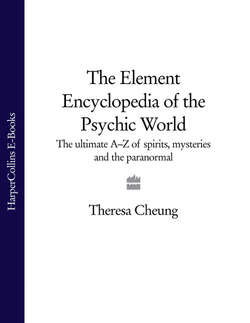Читать книгу The Element Encyclopedia of the Psychic World: The Ultimate A–Z of Spirits, Mysteries and the Paranormal - Theresa Cheung, Theresa Cheung - Страница 6
Fact or fiction?
ОглавлениеIs the psychic world real? I’ll give you the answer straight out: No one knows for certain.
There are, however, many theories to explain the thousands upon thousands of documented experiences that people around the world have had since the beginning of recorded history. Some believe psychic phenomena are real, whether or not science, fraud, misinterpretation, hallucination or natural phenomena can explain them. Others argue that if something is unexplainable by science, it cannot be real. These two sides - believers and sceptics - engage in heated debates over whether reports of paranormal experiences are misinterpretations, coincidences, the product of hallucinations or something more substantial.
Meanwhile, researchers into paranormal phenomena continue to seek explanations. It seems that the three hardest words for human beings to utter are ‘I don’t know’. We demand an accounting for every claim or experience, even if that experience seems unexplainable. Consequently, scientists, parapsychologists and psychologists have come up with a variety of theories for why paranormal phenomena exist, if they exist. For example:
Sceptic: ‘Anecdotal evidence, characteristic of most psychic phenomena, is basically unreliable. Anecdotes may have natural, not mysterious explanations, such as random coincidence, fraud, imagination, or auto-suggestion.’
A believer responds: ‘The hard evidence for psychic phenomena today is founded on repeat-able experiments and not anecdotal evidence. Anecdotal evidence is considered valid in law and many other fields. The validity of anecdotal evidence does not depend upon the opinion of those listening to it.’
Sceptic: ‘If an experiment is not controlled to prevent fraud, then the results may not be trusted. This is especially so given the fact that many people who claimed to possess psychic abilities were later proven to be frauds. Parapsychology experiments are usually poorly designed. They often lack proper controls, allowing paths of intentional or unintentional information leakage through normal means.’
A believer responds: ‘There is no such thing as a completely foolproof experiment in any field of science, and it is unreasonable to hold parapsychology to a higher standard than the other sciences. Fraud and incompetence in parapsychology is addressed in the same way it is addressed in any other field of science: repeating experiments at multiple independent laboratories, and publishing methods and results in order to receive critical feedback and design better protocols, etc’
Sceptic: ‘Parapsychology experiments are rarely replicated with positive results at independent laboratories.’
A believer responds: ‘The existence of certain psychic phenomena has been reasonably well established in recent times through repeatable experiments that have been replicated dozens of times at labs around the world.’
Sceptic: ‘Positive results in psychic experiments are so statistically insignificant as to be negligible, i.e. indistinguishable from chance. For example, parapsychology may have a “file drawer” problem where a large percentage of negative results are never published, making positive results appear more significant than they actually are.’
A believer responds: ‘Experimental protocols have been continually improved over time, sometimes with the direct assistance of noted sceptics. Meta-analyses show that the significance of the positive results has not declined over time, but instead has remained fairly constant. There are certain phenomena that have been replicated with odds against chance far beyond that required for acceptance in any other science.’
Sceptic: ‘Currently unexplainable positive results of apparently sound experiments do not prove the existence of psychic phenomena, i.e. normal explanations may yet be found. In other words, psychic phenomena cannot be accepted as explanation of positive results until there is a widely acceptable theory of how they operate.’
A believer responds: ‘Anomalous phenomena do not disappear for lack of a theory. There have been many instances in the history of science where the observation of an anomalous phenomenon came before an explanatory theory, and some commonly accepted non-psychic phenomena today still lack a perfectly satisfactory, undisputed theory. For instance, in the past, those who sighted meteors falling to the earth were dismissed as madmen or false prophets.’
The dialogue between sceptic and believer continues endlessly. It’s a fascinating debate but as you can see from the brief snapshot above, each theory presented only fuels the arguments. While sceptics, scientists, parapsychologists, researchers and psychics debate the case for and/or against psychic phenomenon all we can do is decide on which side of the fence we wish to sit; and if we can’t decide we just have to sit on the fence instead.
Perhaps some of the arguments and theories for and against will convince you; perhaps they won’t. For the majority, though, the decision isn’t going to be based on evidence or data or what the scientists say but on individual experience and belief.
Do you believe in the psychic world, or don’t you?
